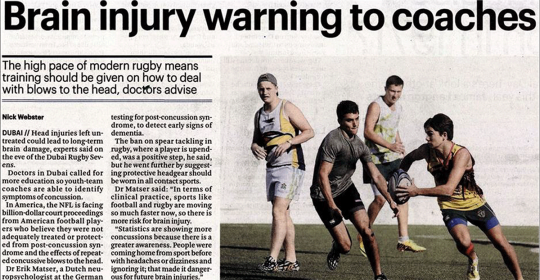
Brain Injury Warning And The Way Out
DUBAI | The National | Nick Webster | December 1, 2015 |Head injuries left untreated could lead to long-term brain damage, experts said. Doctors in Dubai called for more education so youth-team coaches are able to identify symptoms of concussion.
In America, the NFL is facing billion-dollar court proceedings from American football players who believe they were not adequately treated or protected from post-concussion syndrome and the effects of repeated concussive blows to the head.
Dr Erik Matser, a Dutch neuropsychologist at the German Neuroscience Centre in Dubai Healthcare City, has worked with Chelsea and Liverpool English football clubs, among others, and believes rules need to be changed as a matter of urgency to protect players. “The extent of serious head injuries in rugby has been a big issue for some time and players are being made to take unnecessary risks,” he said. “The link between rugby and traumatic brain injury is a particular concern and there are a number of measures that can be taken to improve safety.”
Dr Matser recommends that sideline assessments are made compulsory after a head injury, with a six-week ban on playing and contact training following a diagnosis. He also recommends annual testing for post-concussion syndrome, to detect early signs of dementia. The ban on spear tackling in rugby, where a player is upended, was a positive step, he said, but he went further by suggesting protective headgear should be worn in all contact sports.
Dr Matser said: “In terms of clinical practice, sports like football and rugby are moving so much faster now, so there is more risk for brain injury. “Statistics are showing more concussions because there is a greater awareness. People were coming home from sport before with headaches or dizziness and ignoring it; that made it dangerous for future brain injuries.”
A history of development or psychiatric disorders, or a history of headaches, could play a part in recovery time. Research suggests that for every concussion, the person is one to two times more likely to get a second concussion; two to four times more likely to get a third; and three to nine times more likely to get a fourth.
“The treatment changed my life. I still have ups and downs and need to be careful about sensory overload but I know how to deal with the symptoms now,”
Stuart Rayer, a teacher and rugby coach at Jumeirah College for boys aged 12 to 19, said training on how to deal with head injuries on the field was limited. “We have had little training up to now, but we do have a specialist coming to speak to the school about concussion on January 7,” he said. “It is something we are aware of and taking steps for all coaches involved to have a better understanding of head injuries.” Mr Rayer warned against making protective gear compulsory in young players learning the game, because it could encourage unnecessary risks on the field. “The man-and-ball tackle is part of the modern game now,” he said. “But players still need to be taught how to enter collision areas safely. “I’m not sure making protective headgear compulsory in younger players is the answer. In my experience, it gives players a false sense of security and they will often go in harder.”
Neuropsychological testing has been used for more than 30 years in assessing cognitive function after concussive injuries, measuring cognitive skills and abilities such as intelligence, problem solving, memory, concentration, impulse control and reactions.
A Dutch resident in Muscat who suffered a head injury in a kneeboarding accident last year said. “I was behind the speedboat when I came off and somehow the board hit me pretty hard,” the 37-year-old said. “I felt my brain move on the inside of my skull. I was drowsy and disorientated.” After two weeks rest he returned to work but found it difficult to concentrate for long periods and suffered “brain fog”.
He read about the work of Dr Matser and visited his Dubai clinic. “The treatment changed my life. I still have ups and downs and need to be careful about sensory overload but I know how to deal with the symptoms now,” he said.
More information about Traumatic Brain Injury

